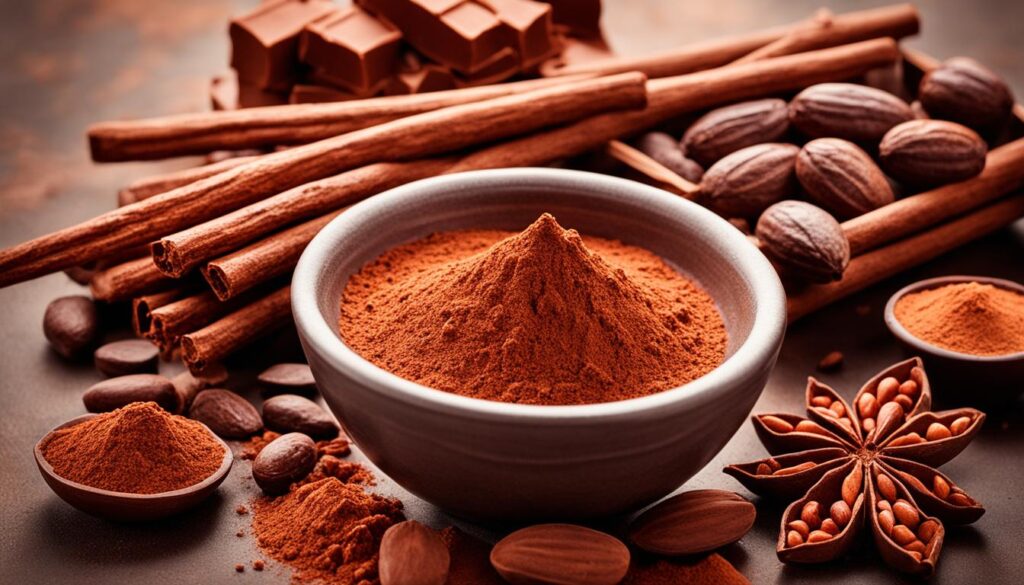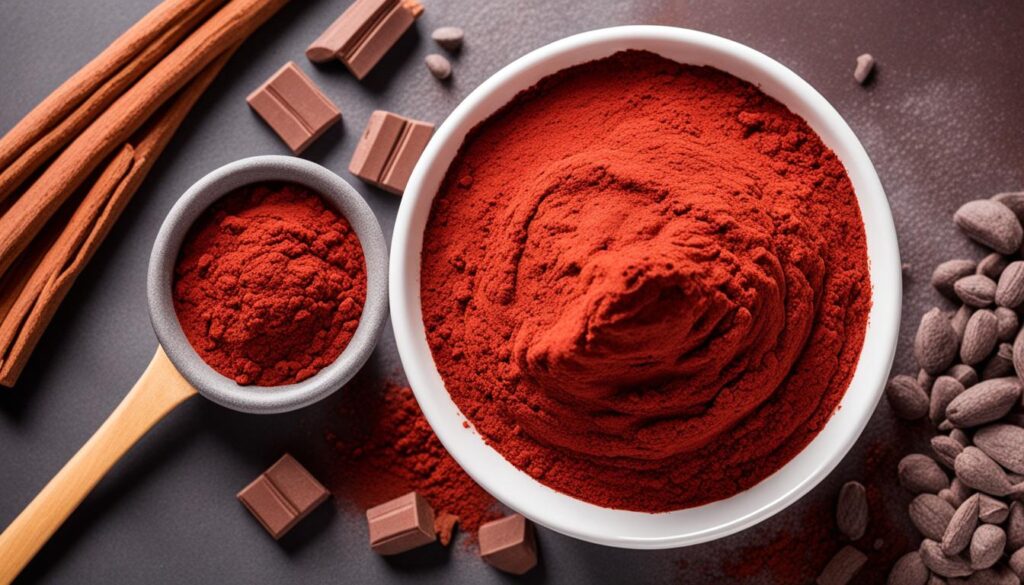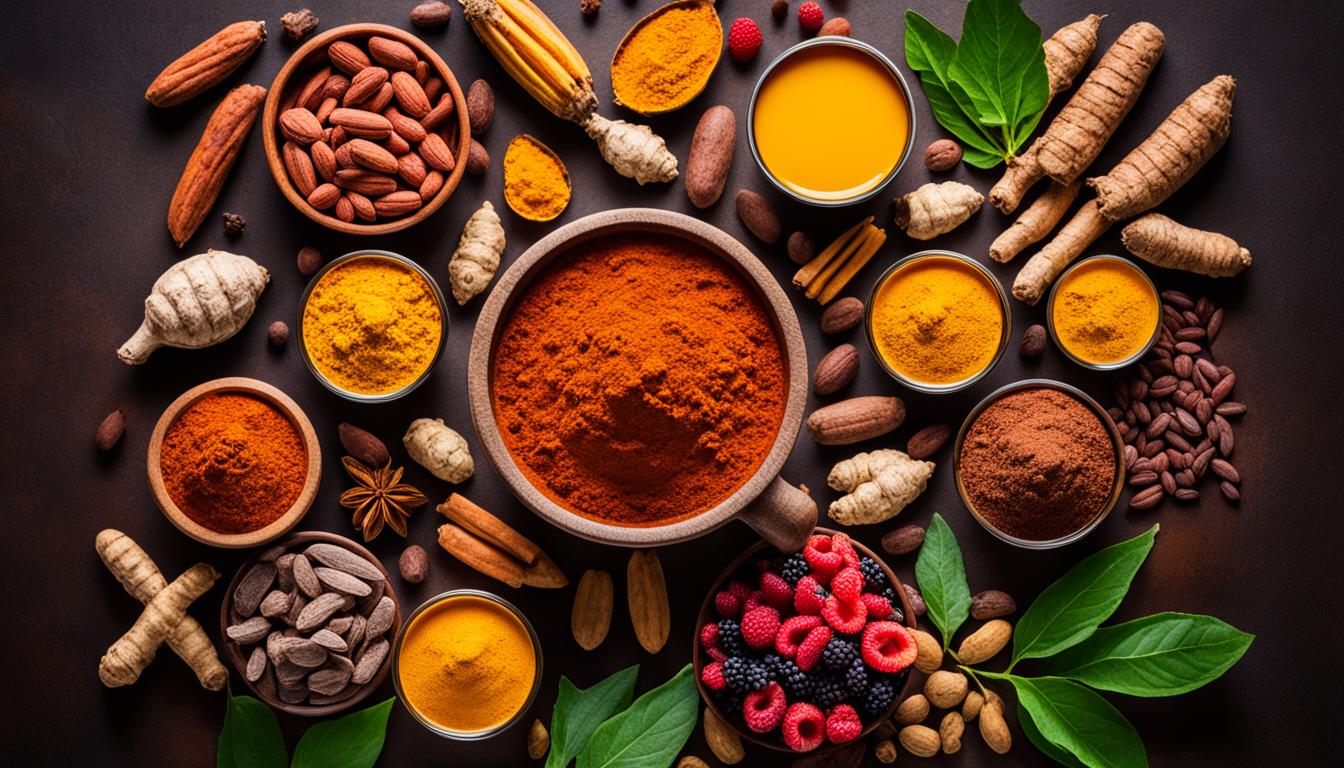Cocoa, the key ingredient in chocolate, has been gaining attention for its potential role in reducing inflammation in the body. Inflammation is the body’s natural response to injury or infection, but chronic inflammation can lead to a range of health issues. The good news is that cocoa’s bioactive compounds and antioxidant properties may help mitigate inflammation, offering potential benefits for overall health and well-being. In this article, we’ll explore the science behind cocoa’s anti-inflammatory effects and how it can be incorporated into a healthy, inflammation-reducing lifestyle.
Key Takeaways
- Cocoa is a rich source of bioactive compounds, including flavonoids, polyphenols, and methylxanthines, which have been studied for their potential anti-inflammatory properties.
- The antioxidant properties of cocoa, particularly its flavonoid content, play a crucial role in combating oxidative stress and reducing inflammation in the body.
- Cocoa can help modulate inflammatory pathways by targeting specific signaling molecules and transcription factors.
- Incorporating cocoa into the diet may have therapeutic implications for managing chronic inflammatory conditions, such as arthritis and cardiovascular disease.
- The anti-inflammatory effects of cocoa may also extend to exercise-induced inflammation and mental health by reducing brain inflammation.
The Wonders of Cocoa: An Anti-Inflammatory Powerhouse
Cocoa, the key ingredient in chocolate, has been the subject of extensive research for its potential role in reducing inflammation in the body. This is largely due to the rich array of bioactive compounds found in cocoa, including flavonoids, polyphenols, and methylxanthines, which are believed to play a significant role in cocoa’s anti-inflammatory properties.
Exploring the Potential Benefits of Cocoa for Reducing Inflammation
The bioactive compounds in cocoa have been extensively studied for their health benefits, and their ability to modulate the body’s inflammatory response is a primary area of interest. These compounds, particularly the flavonoids, are known for their potent antioxidant properties, which can help combat oxidative stress and reduce inflammation at the cellular level.
Understanding the Relationship Between Cocoa and Inflammation
The relationship between cocoa and inflammation is complex and multifaceted. Cocoa’s bioactive compounds have been shown to influence various inflammatory pathways, targeting specific signaling molecules and transcription factors that regulate the body’s inflammatory response. By modulating these pathways, cocoa may help mitigate the risk of chronic inflammatory conditions and provide a natural, therapeutic approach to managing inflammation.
Cocoa’s Antioxidant Properties

Cocoa is renowned for its impressive antioxidant content, which plays a crucial role in its anti-inflammatory effects. The flavonoids present in cocoa, such as epicatechin and catechin, are powerful antioxidants that can neutralize free radicals and reduce oxidative stress, key drivers of inflammation.
The Power of Flavonoids in Cocoa
Cocoa is a rich source of bioactive compounds, including flavonoids, which have been extensively studied for their potential health benefits. These antioxidant compounds possess the ability to scavenge harmful free radicals, preventing them from causing damage to cells and tissues throughout the body.
How Antioxidants Combat Inflammation in the Body
The antioxidant properties of cocoa play a crucial role in reducing inflammation by targeting the underlying causes. By neutralizing free radicals and mitigating oxidative stress, the bioactive compounds in cocoa can help modulate inflammatory pathways, ultimately leading to a reduction in overall inflammatory levels.
The Role of Cocoa in Modulating Inflammatory Pathways
Cocoa’s bioactive compounds, particularly the flavonoids, have been shown to play a crucial role in modulating inflammatory pathways in the body. By targeting specific signaling molecules and transcription factors, cocoa can help regulate the body’s inflammatory response and potentially mitigate the risk of chronic inflammatory conditions.
The flavonoids found in cocoa, such as epicatechin and catechin, possess potent anti-inflammatory properties that can interfere with the activation of key inflammatory pathways. These compounds have been observed to inhibit the production of pro-inflammatory cytokines, as well as suppress the activity of enzymes responsible for inflammation, like cyclooxygenase (COX) and lipoxygenase (LOX).
Furthermore, cocoa’s antioxidant capabilities play a crucial role in its ability to modulate inflammatory pathways. The antioxidants in cocoa can neutralize free radicals and reduce oxidative stress, which are closely linked to the promotion of inflammation in the body.
By targeting multiple steps in the inflammatory cascade, cocoa’s bioactive compounds demonstrate a multifaceted approach to reducing inflammation. This makes cocoa a promising natural compound for individuals seeking to mitigate the effects of chronic inflammation and potentially lower the risk of associated health conditions.
Cocoa and Chronic Inflammatory Conditions

The anti-inflammatory properties of cocoa may have therapeutic implications for various chronic inflammatory conditions, such as arthritis and cardiovascular disease. Emerging research suggests that incorporating cocoa into the diet could potentially help manage inflammation associated with these conditions.
Can Cocoa Help Manage Arthritis and Joint Inflammation?
One area of interest is the potential for cocoa to help manage arthritis and joint inflammation. Studies have indicated that the bioactive compounds in cocoa, particularly the flavonoids, may possess anti-inflammatory and cartilage-protective effects, which could potentially alleviate symptoms and slow the progression of osteoarthritis.
Exploring the Effects of Cocoa on Cardiovascular Inflammation
Similarly, cocoa has shown promise in addressing cardiovascular inflammation, a key contributor to the development of heart disease. The antioxidant and anti-inflammatory properties of cocoa may help mitigate the inflammatory processes that underlie the development of atherosclerosis and other cardiovascular conditions.
| Chronic Inflammatory Condition | Potential Benefits of Cocoa |
|---|---|
| Arthritis | Anti-inflammatory and cartilage-protective effects |
| Cardiovascular Disease | Reduction of inflammation in the cardiovascular system |
By incorporating cocoa into a balanced and healthy lifestyle, individuals with chronic inflammatory conditions may find potential relief and improved management of their symptoms. As research in this area continues to evolve, the role of cocoa in addressing these complex health challenges becomes increasingly compelling.
Dietary Intake of Cocoa and Inflammation Levels

Incorporating the right amount of cocoa into your diet can be key to harnessing its anti-inflammatory benefits. Research suggests that there is a dose-dependent relationship between cocoa intake and its ability to reduce inflammation in the body. In other words, higher levels of cocoa consumption may provide greater anti-inflammatory effects.
How Much Cocoa is Enough to Reduce Inflammation?
Studies have found that consuming around 40-50 grams of cocoa per day can have significant anti-inflammatory benefits. This amount of dietary intake of cocoa has been shown to help reduce inflammation by modulating inflammatory pathways and combating oxidative stress.
Incorporating Cocoa into an Anti-Inflammatory Diet
To incorporate cocoa into an anti-inflammatory diet, you can enjoy a small serving of dark chocolate (containing at least 70% cocoa) or incorporate cocoa powder into your favorite smoothies, baked goods, or hot drinks. It’s important to pay attention to the recommended cocoa intake for reducing inflammation and avoid overconsumption, as excessive intake of cocoa can potentially have negative health effects.
What role does cocoa play in reducing inflammation in the body?

Cocoa plays a significant role in reducing inflammation in the body through its unique bioactive compounds and antioxidant properties. The flavonoids, polyphenols, and methylxanthines present in cocoa have been extensively studied for their ability to modulate inflammatory pathways and combat oxidative stress, two key drivers of the inflammatory response.
These potent anti-inflammatory compounds found in cocoa can help mitigate the body’s inflammatory processes, potentially offering a range of health benefits. By targeting the root causes of inflammation, cocoa can play a crucial role in supporting overall well-being and potentially managing various chronic inflammatory conditions.
Incorporating cocoa or dark chocolate into a balanced diet can be a natural and effective way to harness the anti-inflammatory properties of cocoa and integrate them into a lifestyle that promotes reduced inflammation. This versatile ingredient can be enjoyed in a variety of ways, making it an accessible and enjoyable addition to an anti-inflammatory regimen.
| Key Benefits of Cocoa for Reducing Inflammation | Mechanisms of Action |
|---|---|
|
|
By harnessing the anti-inflammatory properties of cocoa, individuals can potentially benefit from its ability to reduce inflammation and support overall health and well-being. As research continues to explore the role of cocoa in inflammation, the future looks promising for this versatile and beneficial ingredient.
Cocoa and Exercise-Induced Inflammation

As active individuals and athletes push their bodies to the limit, they often face the challenge of exercise-induced inflammation. However, emerging research suggests that cocoa may play a pivotal role in mitigating this inflammation. The bioactive compounds found in cocoa, such as flavanols, have demonstrated potent anti-inflammatory properties that could potentially benefit those engaged in regular physical activity.
The Benefits of Cocoa for Active Individuals
A study by Berry NM et al. found that cocoa flavanol consumption can impact blood pressure responsiveness to exercise, showing a reduction in blood pressure after cocoa flavanol consumption. This suggests that the anti-inflammatory effects of cocoa may have positive implications for active individuals, potentially helping to regulate their cardiovascular response to exercise.
Furthermore, a systematic review by Decroix L et al. focused on cocoa flavanol supplementation and exercise, revealing promising effects on human performance and recovery. This highlights the potential for cocoa to support active individuals in their pursuit of enhanced athletic abilities and faster recovery times.
Cocoa as a Potential Recovery Aid for Athletes
The anti-inflammatory benefits of cocoa may also extend to athletes seeking effective recovery strategies. Fraga CG et al. found that regular consumption of flavanol-rich chocolate could improve oxidant stress in young soccer players, demonstrating the potential for cocoa to support athletes in managing exercise-induced inflammation and oxidative stress.
Additionally, Martins TF et al. highlighted the protective effects of cocoa flavanols on human endothelial cells from oxidative stress. This suggests that incorporating cocoa into an athlete’s diet could potentially aid in the recovery process and enhance their overall well-being.
Cocoa and Mental Health: The Inflammation Connection

Emerging research suggests that cocoa’s anti-inflammatory properties may also have implications for mental health. The bioactive compounds in cocoa have been studied for their potential to reduce inflammation in the brain, which is increasingly recognized as a contributing factor to various neurological and psychiatric conditions.
Can Cocoa Reduce Inflammation in the Brain?
Numerous studies have indicated that the cocoa and mental health relationship may be closely tied to the ability of cocoa’s bioactive compounds to mitigate brain inflammation. Compounds like flavonoids and polyphenols found in cocoa have been shown to possess anti-inflammatory properties that can potentially modulate inflammatory pathways in the brain.
For instance, a study by Crews WD. Harrison DW. Wright JW. found that the consumption of dark chocolate and cocoa can have positive effects on neuropsychological functioning and cardiovascular health in older adults, suggesting that cocoa and its anti-inflammatory effects may play a role in maintaining cognitive function and mental well-being.
Furthermore, research has indicated that the anti-inflammatory benefits of cocoa may extend to conditions like depression and anxiety, where inflammation has been linked to the pathophysiology of these mental health disorders. By reducing inflammation in the brain, cocoa may offer a natural and potentially effective approach to supporting mental health and psychological well-being.
As the scientific understanding of the relationship between cocoa, inflammation, and mental health continues to evolve, the potential for cocoa to serve as a valuable tool in maintaining brain health and supporting cognitive function becomes increasingly apparent. The anti-inflammatory properties of cocoa may open up new avenues for exploring natural, holistic approaches to mental health and well-being.
The Dark Side of Cocoa: Potential Risks and Considerations

While the anti-inflammatory benefits of cocoa are well-documented, it’s important to be aware of the potential risks and considerations associated with its consumption. Moderation is key, and individuals should be mindful of any potential interactions with medications or pre-existing health conditions.
Moderation is Key: Avoiding Overconsumption of Cocoa
Although cocoa is generally considered safe, it’s essential to consume it in moderation. Overconsumption of cocoa can lead to potential side effects, such as digestive issues, headaches, and even caffeine-related jitteriness or insomnia. It’s recommended to stick to the recommended serving sizes and to be aware of one’s individual tolerance to the bioactive compounds in cocoa.
Cocoa and Drug Interactions: What You Need to Know
Cocoa can also interact with certain medications, which is an important consideration for individuals with pre-existing health conditions. Cocoa and drug interactions may include potential conflicts with blood thinners, antidepressants, and medications for high blood pressure or heart disease. Consulting with a healthcare professional is advised to ensure the safe and responsible consumption of cocoa, especially for those taking prescription drugs.
By understanding the potential risks of cocoa, individuals can better navigate their consumption and incorporate this delicious and nutritious ingredient into a healthy, balanced lifestyle. As with any food or supplement, moderation and awareness of personal health needs are key to maximizing the benefits and minimizing any potential drawbacks.
Cocoa Processing and Inflammation: Does It Matter?

The way cocoa is processed can have a significant impact on its anti-inflammatory properties. Different cocoa processing methods can influence the bioavailability and concentration of the bioactive compounds, such as flavonoids, polyphenols, and methylxanthines, which are largely responsible for cocoa’s ability to reduce inflammation.
The Impact of Cocoa Processing on Anti-Inflammatory Properties
Cocoa beans undergo a series of processing steps, including fermentation, drying, roasting, and alkalization, before they are transformed into the chocolate we enjoy. These processing methods can alter the chemical composition and structure of the bioactive compounds in cocoa, ultimately affecting their potency and effectiveness in combating inflammation.
| Cocoa Processing Method | Impact on Anti-Inflammatory Properties |
|---|---|
| Fermentation | Helps to develop the characteristic cocoa flavor and aroma, but can also reduce the concentration of certain flavonoids and polyphenols. |
| Roasting | Increases the bioavailability of some antioxidant compounds, but can also degrade others, potentially impacting the overall anti-inflammatory potential. |
| Alkalization (Dutch processing) | Reduces the acidity of cocoa, but can also significantly decrease the content of flavonoids, leading to a diminished anti-inflammatory effect. |
Understanding the impact of cocoa processing on the anti-inflammatory properties of the final product is crucial for maximizing the potential health benefits of cocoa consumption. Consumers and manufacturers should be mindful of the processing methods used and strive to preserve the bioactive compounds that contribute to cocoa’s anti-inflammatory potential.
Emerging Research on Cocoa and Inflammation

The research on the anti-inflammatory properties of cocoa is ongoing, with new studies constantly exploring its potential therapeutic applications. As the scientific understanding of the mechanisms behind cocoa’s anti-inflammatory effects continues to evolve, the future of cocoa as a natural and effective agent for reducing inflammation looks promising.
Exploring the Future of Cocoa as an Anti-Inflammatory Agent
Recent studies have shed light on the promising role of cocoa in mitigating inflammation. For instance, a study by Almoosawi et al. (2010) examined the effect of polyphenol-rich dark chocolate on various health markers, including fasting blood glucose, cholesterol, and blood pressure, in healthy overweight and obese individuals. The findings suggest that regular consumption of cocoa-rich products may help regulate inflammatory processes and improve cardiovascular health.
Furthermore, Baba et al. (2007) observed favorable changes in plasma LDL and HDL cholesterol, as well as oxidized LDL levels, after participants consumed varying amounts of cocoa powder. These results underscore the potential of cocoa in modulating lipid profiles and reducing inflammation associated with cardiovascular disease.
As the scientific exploration of cocoa’s anti-inflammatory properties continues, researchers are also delving into its impact on cognitive function and neurological health. A study by Crews et al. (2008) found that the consumption of dark chocolate and cocoa may have beneficial effects on neuropsychological functioning and cardiovascular health in healthy, older adults, further solidifying the multifaceted benefits of this versatile food ingredient.
With the growing body of emerging research on cocoa and inflammation, the future of cocoa as a natural and effective anti-inflammatory agent holds great promise. As the understanding of the mechanisms behind cocoa’s anti-inflammatory effects continues to evolve, healthcare professionals and consumers alike may increasingly incorporate this versatile ingredient into their strategies for reducing inflammation and promoting overall well-being.
Conclusion
In conclusion, the overwhelming evidence suggests that cocoa plays a significant role in reducing inflammation in the body. The bioactive compounds found in cocoa, particularly the flavonoids, polyphenols, and methylxanthines, possess potent anti-inflammatory properties that can modulate inflammatory pathways, combat oxidative stress, and provide a range of health benefits.
The summary of cocoa’s anti-inflammatory benefits underscores its potential as a natural and effective agent for reducing inflammation. Key takeaways on the role of cocoa in reducing inflammation include its ability to regulate inflammatory pathways, its antioxidant properties, and its potential applications for managing chronic inflammatory conditions such as arthritis and cardiovascular disease.
As the research on cocoa’s anti-inflammatory effects continues to evolve, the future looks promising for incorporating this versatile ingredient into a holistic, inflammation-reducing lifestyle. By understanding the science behind cocoa’s benefits and the importance of moderation, individuals can take proactive steps towards improved overall health and well-being.

Leave a Reply